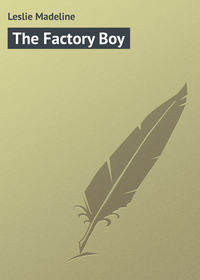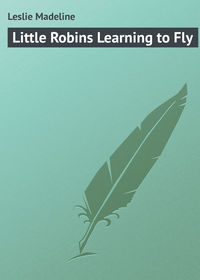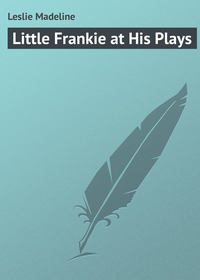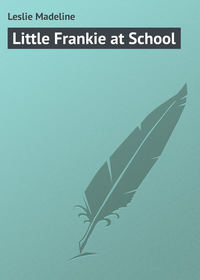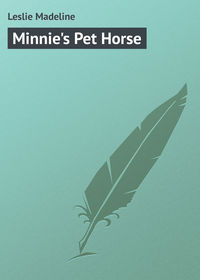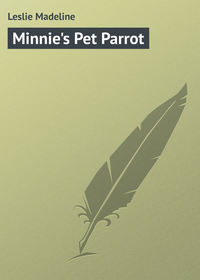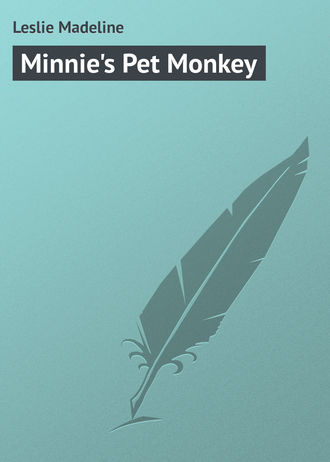
Minnie's Pet Monkey
“I can’t say, my dear; and indeed I think it would be hardly worth the pains to spend a great deal of time in teaching him. He seems to learn quite fast enough by himself. Indeed, he is so full of tricks, and so troublesome to cook in hiding her kitchen utensils, I am afraid we shall have to put him in close confinement.”
“I had rather uncle Frank would carry him back to Africa,” sighed the child. “He would be so unhappy.”
“Well, dear, I wouldn’t grieve about it now. We must manage somehow till uncle Frank comes, and then perhaps he can tell us what to do. Now I’ll read you another story.”
“A monkey living with a gentleman in the country became so troublesome that the servants were constantly complaining.”
“That seems similar to our case,” said the lady, smiling, as she interrupted the reading.
“One day, having his offers of assistance rudely repulsed, he went into the next house by a window in the second story, which was unfortunately open. Here he pulled out a small drawer, where the lady kept ribbons, laces, and handkerchiefs, and putting them in a foot-tub, rubbed away vigorously for an hour, with all the soap and water there were to be found in the room.
“When the lady returned to the chamber, he was busily engaged in spreading the torn and disfigured remnants to dry.
“He knew well enough he was doing wrong; for, without her speaking to him, he made off quickly and ran home, where he hid himself in the case of the large kitchen clock.
“The servants at once knew he had been in mischief, as this was his place of refuge when he was in disgrace.
“One day he watched the cook while she was preparing some partridges for dinner, and concluded that all birds ought to be so treated. He soon managed to get into the yard, where his mistress kept a few pet bantam fowls, and, after eating their eggs, he secured one of the hens, and began plucking it. The noise of the poor bird called some of the servants to the rescue, when they found the half-plucked creature in such a pitiable condition that they killed it at once. After this, Mr. Monkey was chained up, and soon died.”
Minnie looked very grave after hearing this story, and presently said, “I wonder how old that monkey was.”
“The book does not mention his age, my dear. Why?”
“I was thinking that perhaps, as Jacko grows older, he may learn better; and then I said to myself, ‘That one must have been young.’”
“If a monkey is really inclined to be vicious, he is almost unbearable,” remarked the lady. “His company does not begin to compensate for the trouble he makes. Sometimes he is only cunning, but otherwise mild and tractable.”
“And which, mamma, do you think Jacko is?”
“I have always thought, until lately, that he was one of the better kind; but I have now a good many doubts whether you enjoy her funny tricks enough to compensate cook for all the mischief she does. If I knew any one who wanted a pet monkey, and would treat him kindly, I should be glad to have him go. I should hate to have him killed.”
“Killed!” screamed Minnie, with a look of horror; “O, mamma, I wouldn’t have one of my pets killed for any thing.”
Mrs. Lee thought that would probably be at some time Nannie’s fate, but she wisely said nothing.
“Please read more, mamma. I don’t want to think about such awful things.”
The lady cast her eyes over the page, and laughed heartily. Presently she said, “Here is a very curious anecdote, which I will read you; but first I must explain to you what a sounding-board is.
“In old fashioned churches, there used to hang, directly over the pulpit, a large, round board, like the top of a table, which, it was thought, assisted the minister’s voice to be heard by all the congregation. I can remember, when I was a child, going to visit my grandmother, and accompanying her to church, where there was a sounding-board. I worried, through the whole service, for fear it would fall on the minister’s head and kill him. But I will read.”
“There was once an eminent clergyman by the name of Casaubon, who kept in his family a tame monkey, of which he was very fond. This animal, which was allowed its liberty, liked to follow the minister, when he went out, but on the Sabbath was usually shut up till his owner was out of sight, on his way to church.
“But one Sabbath morning, when the clergyman, taking his sermon under his arm, went out, the monkey followed him unobserved, and watching the opportunity while his master was speaking to a gentleman on the steps, ran up at the back of the pulpit, and jumped upon the sounding-board.
“Here he gravely seated himself, looking round in a knowing manner on the congregation, who were greatly amused at so strange a spectacle.
“The services proceeded as usual, while the monkey, who evidently much enjoyed the sight of so many people, occasionally peeped over the sounding-board, to observe the movements of his master, who was unconscious of his presence.
“When the sermon commenced, many little forms were convulsed with laughter, which conduct so shocked the good pastor, that he thought it his duty to administer a reproof, which he did with considerable action of his hands and arms.
“The monkey, who had now become familiar with the scene, imitated every motion, until at last a scarcely suppressed smile appeared upon the countenance of most of the audience. This occurred, too, in one of the most solemn passages in the discourse; and so horrible did the levity appear to the good minister, that he launched forth into violent rebuke, every word being enforced by great energy of action.
“All this time, the little fellow overhead mimicked every movement with ardor and exactness.
“The audience, witnessing this apparent competition between the good man and his monkey, could no longer retain the least appearance of composure, and burst into roars of laughter, in the midst of which one of the congregation kindly relieved the horror of the pastor at the irreverence and impiety of his flock, by pointing out the cause of the merriment.
“Casting his eyes upward, the minister could just discern the animal standing on the end of the sounding-board, and gesturing with all his might, when he found it difficult to control himself, though highly exasperated at the occurrence. He gave directions to have the monkey removed, and sat down to compose himself, and allow his congregation to recover their equanimity while the order was being obeyed.”
CHAPTER V.
JACKO IN THE PANTRY
In his frequent visits to the stable, Jacko amused himself by catching mice that crept out to pick up the corn.
The servants, having noticed his skill, thought they would turn it to good account, and having been troubled with mice in the pantry, determined to take advantage of the absence of Mrs. Lee on a journey, and shut the monkey up in it. So, one evening, they took him out of his comfortable bed, and chained him up in the larder, having removed every thing except some jam pots, which they thought out of his reach, and well secured with bladder stretched over the top.
Poor Jacko was evidently much astonished, and quite indignant, at this treatment, but presently consoled himself by jumping into a soup tureen, where he fell sound asleep, while the mice scampered all over the place.
As soon as it was dawn, the mice retired to their holes. Jacko awoke shivering with cold, stretched himself, and then, pushing the soup tureen from the shelf, broke it to pieces. After this achievement, he began to look about for something to eat, when he spied the jam pots on the upper shelf.
“There is something good,” he thought, smelling them. “I’ll see.”
His sharp teeth soon worked an entrance, when the treasured jams, plums, raspberry, strawberry, candied apricots, the pride and care of the cook, disappeared in an unaccountably short time.
At last, his appetite for sweets was satisfied, and coiling his tail in a corner, he lay quietly awaiting the servant’s coming to take him out.
Presently he heard the door cautiously open, when the chamber girl gave a scream of horror as she saw the elegant China dish broken into a thousand bits, and lying scattered on the floor.
She ran in haste to summon Hepsy and the nurse, her heart misgiving her that this was not the end of the calamity. They easily removed Jacko, who began already to experience the sad effects of overloading his stomach, and then found, with alarm and grief, the damage he had done.
For several days the monkey did not recover from the effects of his excess. He was never shut up again in the pantry.
When Mrs. Lee returned she blamed the servants for trying such an experiment in her absence. Jacko was now well, and ready for some new mischief; and Minnie, who heard a ludicrous account of the story, laughed till she cried.
She repeated it, in great glee, to her father, who looked very grave as he said, “We think a sea voyage would do the troublesome fellow good; but you shall have a Canary or a pair of Java sparrows instead.”
“Don’t you know any stories of good monkeys, father?”
“I don’t recollect any at this moment, my dear; but I will see whether I can find any for you.”
He opened the book, and then asked, —
“Did you know, Minnie, that almost all monkeys have bags or pouches in their cheeks, the skin of which is loose, and when empty makes the animal look wrinkled?”
“No, sir; I never heard about it.”
“Yes, that is the case. He puts his food in them, and keeps it there till he wishes to devour it.
“There are some kinds, too, that have what is called prehensile tails; that is, tails by which they can hang themselves to the limb of a tree, and which they use with nearly as much ease as they can their hands. The facility which this affords them for moving about quickly among the branches of trees is astonishing. The firmness of the grasp which it makes is very surprising; for if it winds a single coil around a branch, it is quite sufficient, not only to support its weight, but to enable it to swing in such a manner as to gain a fresh hold with its feet.”
“I’m sure, father,” eagerly cried Minnie, “that Jacko has a prehensile tail, for I have often seen him swing from the ladder which goes up the hay mow.”
“I dare say, child. He seems to be up to every thing. But here is an account of an Indian monkey, of a light grayish yellow color, with black hands and feet. The face is black, with a violet tinge. This is called Hoonuman, and is much venerated by the Hindoos. They believe it to be one of the animals into which the souls of their friends pass at death. If one of these monkeys is killed, the murderer is instantly put to death; and, thus protected, they become a great nuisance, and destroy great quantities of fruit. But in South America, monkeys are killed by the natives as game, for the sake of the flesh. Absolute necessity alone would compel us to eat them. A great naturalist named Humboldt tells us that their manner of cooking them is especially disgusting. They are raised a foot from the ground, and bent into a sitting position, in which they greatly resemble a child, and are roasted in that manner. A hand and arm of a monkey, roasted in this way, are exhibited in a museum in Paris.”
“Monkeys have a curious way of introducing their tails into the fissures or hollows of trees, for the purpose of hooking out eggs and other substances. On approaching a spot where there is a supply of food, they do not alight at once, but take a survey of the neighborhood, a general cry being kept up by the party.”
CHAPTER VI.
THE CRUEL MONKEY
One afternoon, Minnie ran out of breath to the parlor. “Mamma,” she exclaimed, “cook says monkeys are real cruel in their families. Is it true?”
The lady smiled. “I suppose, my dear,” she responded, “that there is a difference of disposition among them. I have heard that they are very fond of their young, and that, when threatened with danger, they mount them on their back, or clasp them to their breast with great affection.
“But I saw lately an anecdote of the cruelty of a monkey to his wife, and if I can find the book, I will read it to you.”
“There is an animal called the fair monkey, which, though the most beautiful of its tribe, is gloomy and cruel. One of these, which, from its extreme beauty and apparent gentleness, was allowed to ramble at liberty over a ship, soon became a great favorite with the crew, and in order to make him perfectly happy, as they imagined, they procured him a wife.
“For some weeks, he was a devoted husband, and showed her every attention and respect. He then grew cool, and began to use her with much cruelty. His treatment made her wretched and dull.
“One day, the crew noticed that he treated her with more kindness than usual, but did not suspect the wicked scheme he had in mind. At last, after winning her favor anew, he persuaded her to go aloft with him, and drew her attention to an object in the distance, when he suddenly gave her a push, which threw her into the sea.
“This cruel act seemed to afford him much gratification, for he descended in high spirits.”
“I should think they would have punished him,” said Minnie, with great indignation.
“Perhaps they did, love. At any rate, it proves that beauty is by no means always to be depended upon.”
Mrs. Lee then took her sewing, but Minnie plead so earnestly for one more story, a good long one, that her mother, who loved to gratify her, complied, and read the account which I shall give you in closing this chapter on Minnie’s pet monkey.
“A gentleman, returning from India, brought a monkey, which he presented to his wife. She called it Sprite, and soon became very fond of it.
“Sprite was very fond of beetles, and also of spiders, and his mistress used sometimes to hold his chain, lengthened by a string, and make him run up the curtains, and clear out the cobwebs for the housekeeper.
“On one occasion, he watched his opportunity, and snatching the chain, ran off, and was soon seated on the top of a cottage, grinning and chattering to the assembled crowd of schoolboys, as much as to say, ‘Catch me if you can.’ He got the whole town in an uproar, but finally leaped over every thing, dragging his chain after him, and nestled himself in his own bed, where he lay with his eyes closed, his mouth open, his sides ready to burst with his running.
“Another time, the little fellow got loose, but remembering his former experience, only stole into the shed, where he tried his hand at cleaning knives. He did not succeed very well in this, however, for the handle was the part he attempted to polish, and, cutting his fingers, he relinquished the sport.
“Resolved not to be defeated, he next set to work to clean the shoes and boots, a row of which were awaiting the boy. But Sprite, not remembering all the steps of the performance, first covered the entire shoe, sole and all, with the blacking, and then emptied the rest of the Day & Martin into it, nearly filling it with the precious fluid. His coat was a nice mess for some days after.
“One morning, when the servants returned to the kitchen, they found Sprite had taken all the kitchen candlesticks out of the cupboard, and arranged them on the fender, as he had once seen done. As soon as he heard the servants returning, he ran to his basket, and tried to look as though nothing had happened.
“Sprite was exceedingly fond of a bath. Occasionally a bowl of water was given him, when he would cunningly try the temperature by putting in his finger, after which he gradually stepped in, first one foot, then the other, till he was comfortably seated. Then he took the soap and rubbed himself all over. Having made a dreadful splashing all around, he jumped out and ran to the fire, shivering. If any body laughed at him during this performance, he made threatening gestures, chattering with all his might to show his displeasure, and sometimes he splashed water all over them.
“Poor Sprite one day nearly committed suicide. As he was brought from a very warm climate, he often suffered exceedingly, in winter, from the cold.
“The cooking was done by a large fire on the open hearth, and as his basket, where he slept, was in one corner of the kitchen, before morning he frequently awoke shivering and blue. The cook was in the habit of making the fire, and then returning to her room to finish her toilet.
“One morning, having lighted the pile of kindlings as usual, she hung on the tea-kettle and went out, shutting the door carefully behind her.
“Sprite thought this a fine opportunity to warm himself. He jumped from his basket, ran to the hearth, and took the lid of the kettle off. Cautiously touching the water with the tip of his finger, he found it just the right heat for a bath, and sprang in, sitting down, leaving only his head above the water.
“This he found exceedingly comfortable for a time; but soon the water began to grow hot. He rose, but the air outside was so cold, he quickly sat down again. He did this several times, and would, no doubt, have been boiled to death, and become a martyr to his own want of pluck and firmness in action, had it not been for the timely return of the cook, who, seeing him sitting there almost lifeless, seized him by the head and pulled him out.
“He was rolled in blankets, and laid in his basket, where he soon recovered, and, it is to be hoped, learned a lesson from this hot experience, not to take a bath when the water is on the fire.”
CHAPTER VII.
KEES STEALING EGGS
When Minnie was nine years of age, she accompanied her parents to a menagerie, and there, among other animals, she saw a baboon. She was greatly excited by his curious, uncouth manœuvres, asking twenty questions about him, without giving her father time to answer. On their way home, she inquired, —
“Are baboons one kind of monkeys, father?”
“Yes, my daughter; and a more disagreeable, disgusting animal I cannot conceive of.”
“I hope you are not wishing for a baboon to add to your pets,” added her mother, laughing.
“I don’t believe Jacko would get along with that great fellow at all,” answered the child. “But, father, will you please tell me something more about the curious animals?”
The conversation was here interrupted by seeing that a carriage had stopped just in front of their own, and that quite a crowd had gathered about some person who seemed to be hurt.
Minnie’s sympathies were alive in an instant. She begged her father to get out, as possibly he might be of some use.
The driver stopped of his own accord, and inquired what had happened, and then they saw that it was a spaniel that was hurt. He had been in the road, and not getting out of the way quick enough, the wheel had gone over his body.
The young lady who was in the buggy was greatly distressed, from which Minnie argued that she was kind to animals, and that they should like her.
The owner of the dog held the poor creature in her arms, though it seemed to be in convulsions, and wept bitterly as she found it must die.
Mr. Lee, to please his little daughter, waited a few minutes; but he found her getting so much excited over the suffering animal, he gave John orders to proceed.
During the rest of the drive, she could talk of nothing else, wondering whether the spaniel was alive now, or whether the young man in the buggy paid for hurting it.
The next day, however, having made up her mind that the poor creature must be dead, and his sufferings ended, and having given Tiney many admonitions to keep out of the road when carriages were passing, her thoughts turned once more to the baboon.
Mr. Lee found in his library a book which gave a short account of the animal, which he read to her.
“The baboon is of the monkey tribe, notwithstanding its long, dog-like head, flat, compressed cheeks, and strong and projecting teeth. The form and position of the eyes, combined with the similarity of the arms and hands, give to these creatures a resemblance to humanity as striking as it is disgusting.”
“Then follows an account,” the gentleman went on, “of the peculiarities of different kinds of baboons, which you would not understand.”
“But can’t you tell me something about them yourself, father?”
“I know very little about the creatures, my dear; but I have read that they are exceedingly strong, and of a fiery, vicious temper.
“They can never be wholly tamed, and it is only while restraint of the severest kind is used, that they can be governed at all. If left to their own will, their savage nature resumes its sway, and their actions are cruel, destructive, and disgusting.”
“I saw the man at the menagerie giving them apples,” said Minnie; “but he did not give them any meat all the time I was there.”
“No; they subsist exclusively on fruits, seeds, and other vegetable matter. In the countries where they live, especially near the Cape of Good Hope, the inhabitants chase them with dogs and guns in order to destroy them, on account of the ravages they commit in the fields and gardens. It is said that they make a very obstinate resistance to the dogs, and often have fierce battles with them; but they greatly fear the gun.
“As the baboon grows older, instead of becoming better, his rage increases, so that the slightest cause will provoke him to terrible fury.”
“Is that all you know about them?”
“Why, Minnie, in order to satisfy you, any one must become a walking encyclopædia. What other question have you to ask?”
“Why, they must have something to eat, and how are they to get it unless they go into gardens?”
Mr. Lee laughed aloud. “I rather think I should soon convince them they were not to enter my garden,” he said, emphatically. “But seriously, they descend in vast numbers upon the orchards of fruit, destroying, in a few hours, the work of months, or even of years. In these excursions, they move on a concerted plan, placing sentinels on commanding spots, to give notice of the approach of an enemy. As soon as he perceives danger, the sentinel gives a loud yell, and then the whole troop rush away with the greatest speed, cramming the fruit which they have gathered into their cheek pouches.”
Minnie looked so much disappointed when he ceased speaking, that her mother said, “I read somewhere an account of a baboon that was named Kees, who was the best of his kind that I ever heard of.”
“Yes, that was quite an interesting story, if you can call it to mind,” said the gentleman, rising.
“It was in a book of travels in Africa,” the lady went on. “The traveller, whose name was Le Vaillant, took Kees through all his journey, and the creature really made himself very useful. As a sentinel, he was better than any of the dogs. Indeed, so quick was his sense of danger, that he often gave notice of the approach of beasts of prey, when every thing was apparently secure.
“There was another way in which Kees made himself useful. Whenever they came across any fruits or roots with which the Hottentots were unacquainted, they waited to see whether Kees would taste them. If he threw them down, the traveller concluded they were poisonous or disagreeable, and left them untasted.
“Le Vaillant used to hunt, and frequently took Kees with him on these excursions. The poor fellow understood the preparations making for the sport, and when his master signified his consent that he should go, he showed his joy in the most lively manner. On the way, he would dance about, and then run up into the trees to search for gum, of which he was very fond.
“I recall one amusing trick of Kees,” said the lady, laughing, “which pleased me much when I read it. He sometimes found honey in the hollows of trees, and also a kind of root of which he was very fond, both of which his master insisted on sharing with him. On such occasions, he would run away with his treasure, or hide it in his pouches, or eat it as fast as possible, before Le Vaillant could have time to reach him.
“These roots were very difficult to pull from the ground. Kees’ manner of doing it was this. He would seize the top of the root with his strong teeth, and then, planting himself firmly against the sod, drew himself gradually back, which forced it from the earth. If it proved stubborn, while he still held it in his teeth he threw himself heels over head, which gave such a concussion to the root that it never failed to come out.
“Another habit that Kees had was very curious. He sometimes grew tired with the long marches, and then he would jump on the back of one of the dogs, and oblige it to carry him whole hours. At last the dogs grew weary of this, and one of them determined not to be pressed into service. He now adopted an ingenious artifice. As soon as Kees leaped on his back, he stood still, and let the train pass without moving from the spot. Kees sat quiet, determined that the dog should carry him, until the party were almost out of sight, and then they both ran in great haste to overtake their master.


